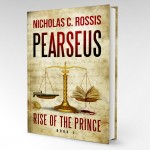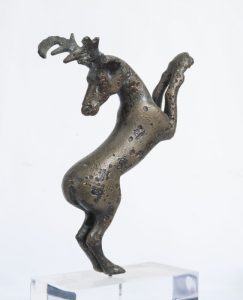Under the ancient oak, home to mighty Zeus, a priest holding a thin sheet of lead is waiting patiently for the widow before him to ask her question. She hesitates for a moment, listening to the rustling leaves over them.
“It’s my job to interpret these,” he jokes.
“I’m sorry,” she says, blushing. Then, she asks her question: “I lost my husband a few years ago. Now, I have met someone. He wants us to get married, but it feels wrong.” She raises pleading eyes to the priest, who’s scribbling down notes on the lead parchment. “I need to know. Should I remarry, or remain a widow?”
Behind her, Hermon, a wealthy merchant, is waiting his turn. The question he wants to ask concerns the future of his family. Which god should he pray to, in order for him and his wife, Kritaian, to have useful heirs to his fortune?
The Dodoni Oracle
Last summer, I wrote about the Acropolis Museum. This year, the museum hosts an exhibition dedicated to the Dodona Oracle. The above are just two of the questions asked by ancient Greeks.
Other questions include: “Am I losing my husband?”;”I’m childless; whom should I date to have some children?”;”Should I take the trip to Carthage?”; and “Should I repay my debts now, or later on?”
About 5,000 of these lead sheets have been unearthed so far, with questions concerning commerce, family fortunes, legal troubles, health, love, and marriage.
Ever since the Copper Age (3,500 BC), Dodona has been functioning as an oracle, dedicated first to the Earth Mother, and then to Zeus, who was believed to reside along with his wife, Dioni, inside the roots of a sacred oak. It all started with a sheep thief: the oak identified him, thus starting a millennia-long tradition. The Oracle delivered the god’s will to everyone, from simple people to kings, who would express their gratitude with great gifts.
The end of an era
According to tradition, the Oracle gave its last divination in 362 AD, when king Julian the Apostate asked the gods what he should do in order to fight the new religion, Christianity, and return the world to the old glory.
“The elaborate house has fallen down,” was the disappointing divination. “Apollo no longer has a home, nor an oracular laurel, nor a talking spring.”
The end was near, and in 391 AD, Emperor Theodosius ordered the closure of all oracles. Shortly afterwards, the sacred oak was cut down and a Christian church was built on top of its ruins of the old oracle.
Anyone finding themselves in Athens can visit the Acropolis Museum exhibition and see for themselves how little our questions have changed through the ages.
 This post is part 2 of a multi-part series of posts on ancient and Medieval wonders, to celebrate my 99c Pearseus: Rise of the Prince promo. As Pearseus has been described as “Ancient Greece in space,” it seemed strangely appropriate.
This post is part 2 of a multi-part series of posts on ancient and Medieval wonders, to celebrate my 99c Pearseus: Rise of the Prince promo. As Pearseus has been described as “Ancient Greece in space,” it seemed strangely appropriate.








I don’t know much about Oracles but your post has inspired me to find out more about them. It’s very interesting that the questions you mentioned are the same being asked today.
Thank you! That’s what I loved so much about it–the timelessness of it all 🙂
My great grandmother was an Oracle. She predicted wrecked marriages and disloyal spouse and partners. She said the secrets are not complicated. Just investigate! LOL
But then, these are pretty interesting subjects on such histories. I would really love to read those subjects if one can understand it at all.
(⁀ᗢ⁀)
Amazing! 😀
Fascinating, and I’d love to know their answers, if they are understandable!
There are a few famous ones. For example, the Median emperor Croesus asked if he should invade the Persians. The Oracle replied that by invading, he would destroy a great empire. He invaded, and ended up losing his own empire to the Persians. So, technically speaking, the Oracle was correct.
The episode has actually found its way in my own Pearseus 🙂
That’s incredibly cool that they actually wrote down their questions. I always pictured going to the oracle as kind of like going to the doctor — you show up, you ask your question, you get your confusing answer that you’re pretty sure isn’t quite right but who are you to question an expert?, you pay, and you leave.
Lol – that sounds pretty accurate. Only, you jot down the question on a lead sheet first 😀
I’m wondering what the oracle said to the widow?
Leslie
Lol – sadly, that wasn’t recorded 😀
It would have been interesting to know.
Leslie
Fascinating. Humans haven’t changed, have they? Thanks for sharing, Nicholas. 🙂
Not one bit 🙂
Sigh.
How appropriate that timeless human questions should be chiseled in stone and left for future generations.
Hadn’t thought of it that way! Nice 🙂
Amazing that they keep a record of those old questions – and not surprising that they are the same questions asked today. I guess I understand by new religions would seek to destroy and bury the old ones, but it makes me sad. Interesing post, Nicholas.
I’m particularly interested in Greek oracles, since I adapted versions of Greek Seers and oracular shrines in my termite series. And I have a plan to incarnate the Goddess of Dodona (whom I may name Diona) in my future world, in the another book I might write someday, if I live long enough.
Well, I for one hope that you write a whole bunch of books 🙂
It occurred to me that the modern versions of such things are the numerous clairvoyants and spiritualists, who are followed by devotees, and have shows attended by thousands of believers.
In a world where we are beginning to realise the answers to our questions, many are seeking evidence of an afterlife to look forward to instead.
Best wishes, Pete.
How true! Funny how your comment complements my response to Charles 🙂
I see now that you mentioned carnivals and palm readers. I was thinking more of big businesses, like this lady.
https://www.sallymorgan.tv/call-me-psychic-2016-tour-dates/
She is something of a superstar in the UK, with a huge fan-base. She sells DVD films of her ‘concerts’, T-shirts, souvenirs, and even has premium rate phone lines for you to get the latest psychic updates. And there are many more like her.
There is even a local ‘cottage industry’, where housewives get friends round, and they have personal readings. A bit like a psychic Tupperware Party!
Wow, that’s quite the eye-opener. Thank you for sharing!
Definitely a sad ending. Oracles are a really interesting part of history. I always wondered how often they were correct and how they maintained such influence. In today’s world, we’re so suspicious of these things that it wouldn’t work. An oracle would be called a fraud almost immediately. Yet, what if one showed up in our world and turned out to be right at least 75% of the time?
Erm, I assume you’ve never heard of a carnival? Palmreaders anyone? 🙂
Yes, but I mean that most people don’t take them as seriously as I imagine an Oracle was taken. Many go in with skepticism or even to disprove that the person has any type of power. I guess I’m wondering what would happen if someone showed up with the ability to tell the future and you couldn’t prove they were a fraud.
Sounds like an idea for a book to me 🙂